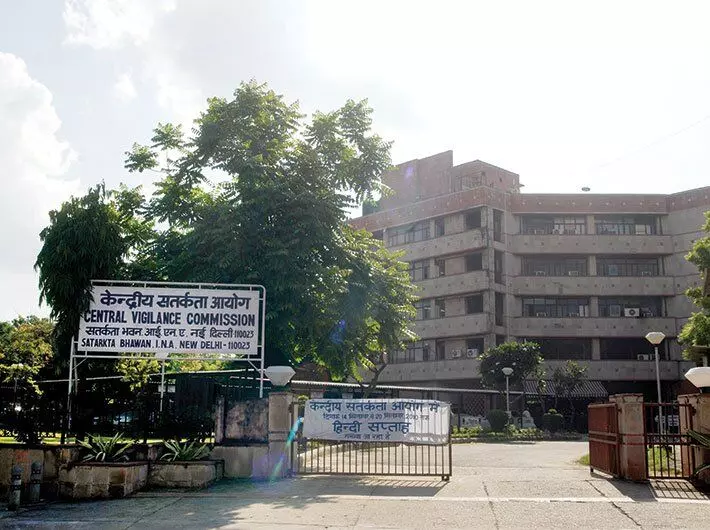Augmenting the watchdog
Implementation of time-bound disciplinary policies can leverage the pan-India presence of Central Vigilance Commission to curtail the scourge of corruption in public service

Vigilance implies clean and prompt administrative action aimed at achieving efficiency and effectiveness in performance; the lack of vigilance leads to economic losses. The Central Vigilance Commission is a key institution in our country in this regard. It was established to prevent corruption, uphold integrity among government servants, and ensure the appropriate exercise of administrative powers. The CVC is an independent body responsible to Parliament. This anti-corruption watchdog is a statutory body that investigates cases of graft or corruption involving government departments and public sector organizations, among others.
One positive development that occurred in 2017 was that the CVC gained the authority to investigate cases of corruption involving private sector banks and their managements. This change was approved by the RBI and the Department of Financial Services. The Honourable Supreme Court ruled that all officials working in banks operating under an RBI license would be defined as public servants under the Prevention of Corruption Act, 1988 (PC Act). The dictum held that bank employees, whether in the private or public sector, were on public duty and therefore fell under the mandate of this law. Reference was made to Section 46A of the Banking Regulation Act in this regard. As a result, the Central Vigilance Commission could now probe allegations of corruption in private sector banks and against their employees, which has significantly improved the system. Afterall, transparency is sine qua non for an economy, and such steps, thanks to the judgment of the Apex court and the involvement of authorities, have been quite positive.
The CVC either gets investigations or inquiries done through the CBI or through Chief Vigilance Officers (CVOs) in administrative offices and not independently. Some amendments can enhance overall results. For instance, in cases where the CVC recommends inquiries into errant officials, it is imperative that these inquiries are expedited, rather than following antiquated procedures involving cumbersome compliances and subsequent disciplinary actions. The formulation and implementation of time-bound disciplinary policies are essential components of any anti-corruption effort or to bring improvements in a lax administration.
One significant reason for corruption in any country is that, at times, guilty parties are not adequately punished, and more importantly, they are not promptly penalized. This is because of the prolonged departmental inquiries, partly because inquiry officers already have the burden of their regular work, and conducting inquiries adds to their workload. The same holds true for Presenting Officers as well. Therefore, provisions should be made for appointing retired employees with credibility to conduct these inquiries, and the names of such individuals could be approved by the CVC. With retired employees, these inquiries can be completed in a timely manner.
Tenders are typically a major source of corruption. To avoid such ambiguities, a more transparent and effective system must be introduced. Details related to contract clauses should be made available online, along with information about the bidders who applied, those selected, and the selection criteria. Furthermore, the need of the hour is to harness the power of technology. It is suggested that important information be disclosed online. This will help prevent misappropriation of resources to a large extent by holding authorities accountable. The increased use of CCTV cameras for overall monitoring in establishments is also recommended.
The CVC plays roles in preventive vigilance, punitive vigilance, surveillance, and detection. Its increased role and supervision can enhance the efficiency of our systems. While organizations like the CVC already have a pan-India role, it is recommended that their physical presence and the awareness spread by their officials reach the remotest parts of our country. Additionally, there are rising expectations from the administration that it should demonstrate and deliver high standards of performance and integrity. Purity in the selection process is a sine qua non. Officials with dubious credentials can be detrimental to our system. It is imperative that the selection criteria and procedures are candid and fair. Skills, performance, and disciplinary records must be scrutinized and made public. Any potential for favouritism or discrimination in officials' promotions should be eliminated from our system. It's vital to establish minimum criteria for advancement and make employees aware of the standards they need to meet to achieve it. Policies should consist of clear-cut norms and criteria, which should be fair and uniformly applicable to all employees without giving scope for nepotism. Reasons for selection and promotion should be recorded and made public to the greatest extent possible. Besides civil appointments, even the selection of contractual bids should follow transparent procedures. The CVC's role in such activities may be considered for enhancement.
With the active involvement of the CVC, as emphasized by the Supreme Court and administrative decisions, a speedier economic development can be achieved.
The writer is a practising Advocate in Supreme Court and High Court of Delhi. Views expressed are personal



